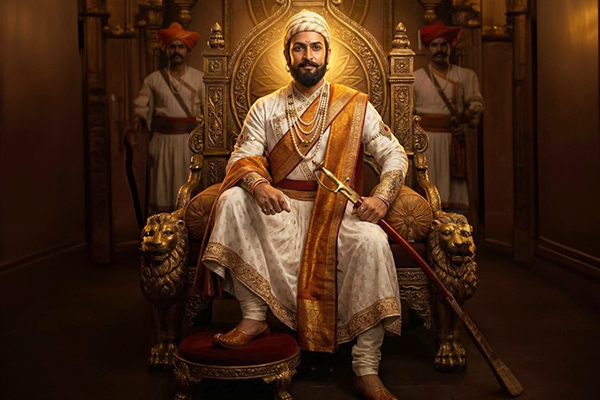
Chhatrapati Shivaji Maharaj Jayanti honors the legacy of one of India’s most revered and legendary figures, Chhatrapati Shivaji Maharaj. In 2026, this grand occasion will fall on Friday, March 6th as per the Hindu calendar. As per the Gregorian calendar the date is Thursday, 19 Feb. Known for his indomitable courage, brilliant military strategies, and deep commitment to justice, Shivaji Maharaj remains an enduring symbol of strength, resilience, and firm leadership.
On Chhatrapati Shivaji Maharaj Jayanti, people across Maharashtra and beyond come together to celebrate his heroism and contributions. The day is marked by vibrant processions, inspiring speeches, cultural performances, and rituals of reverence. Schools, temples, and public spaces are filled with stories of his bravery and wisdom, reminding the world of his greatness and vision. His words and actions continue to resonate with millions, making this day a tribute not just to a historical figure, but to the spirit of courage and justice that he embodied.
Festival Date, Time, Muhurat & Tithi
Chhatrapati Shivaji Maharaj Jayanti falls on
Friday, March 6th, 2026.
This day marks the 395th Birth Anniversary of Chhatrapati Shivaji Maharaj.
Key Timings for Observances:
- Tritiya Tithi Begins - 05:03 PM on Mar 05, 2026
- Tritiya Tithi Ends - 05:53 PM on Mar 06, 2026
Note: This date is as per the Hindu Calendar. Devotees begin their Chhatrapati Shivaji Maharaj Jayanti rituals at sunrise, making it a key time for the day's observances. Sunrise and sunset vary by region and date due to India's geographical diversity. For exact timings, refer to local astronomical data.
Significance of Chhatrapati Shivaji Maharaj Jayanti
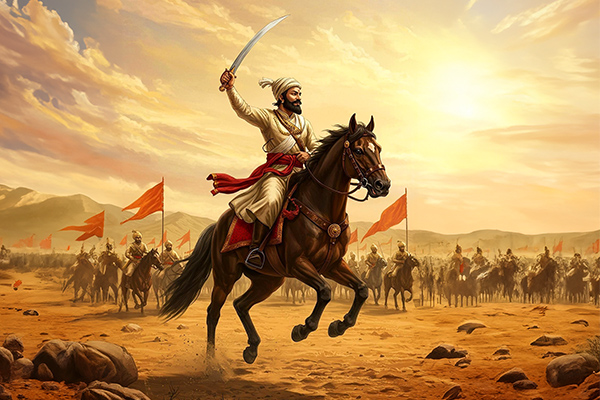
Chhatrapati Shivaji Maharaj Jayanti is not just a day to celebrate the life of a great warrior, but it holds deep cultural, historical, and spiritual significance. This day is a reminder of Shivaji Maharaj's values, his tireless dedication to his people, and his exceptional leadership. His legacy transcends beyond his military victories and administrative skills, offering lessons in righteousness, faith, and moral integrity that resonate even today.
A Symbol of Courage and Justice
Shivaji Maharaj’s life was defined by courage-not just in battle, but in standing up for justice. His unwavering commitment to protect his people and ensure the rule of law in his kingdom exemplifies his spiritual vision of a just and righteous society. For his subjects, he was not just a ruler, but a protector of their dignity and well-being, often going against powerful empires to safeguard their rights. This pursuit of justice aligns with the deep spiritual values of dharma (righteousness) and seva (selfless service), which are central tenets of Indian philosophy.
A Champion of Equality and Religious Tolerance
One of the most spiritually significant aspects of Shivaji Maharaj's reign was his respect for all religions. He was deeply committed to the principles of equality and unity, fostering a kingdom where people of different faiths coexisted peacefully. His policies promoted religious tolerance, and he ensured that the welfare of people from all walks of life, including Hindus, Muslims, and others, was protected. In a time of great religious and political conflict, his inclusive approach stands as a testament to his spiritual wisdom and understanding of humanity’s shared values.
Spiritual Leadership and Divine Guidance
Shivaji Maharaj was known for his deep faith and devotion to God. He often sought the blessings of deities like Bhagwan Shiva, whom he considered his spiritual guide and protector. His devotion to spirituality was reflected in his governance as well — he ruled not just through force, but through wisdom, compassion, and divine guidance. His spiritual connection influenced his decisions, and he believed that his strength and victories were gifts from the divine. This deeper connection with spirituality gave him the strength to overcome insurmountable odds and emerge victorious, which adds a profound layer of spiritual significance to his leadership.
Moral Integrity and Leadership with Purpose
Shivaji Maharaj’s life is an embodiment of the ideals of moral integrity, honesty, and service. His governance was rooted in the principles of fairness, where the welfare of the common people was always prioritized. His strong ethical foundation, his focus on duty (dharma), and his desire to create a just society resonate with the spiritual teachings found in the great scriptures of India. He led by example, showing that leadership is not about power but about serving others with humility and vision.
Inspiring Future Generations
The spiritual significance of Shivaji Maharaj Jayanti lies in its ability to inspire future generations. His life offers lessons on the importance of integrity, courage, compassion, and justice. By observing this day, we not only honor a historical figure, but also renew our commitment to living by values that contribute to a harmonious and righteous world. Shivaji Maharaj’s example encourages individuals to live with purpose, defend what is right, and work towards the collective good of society.
Spiritual Reflection on Unity and National Pride
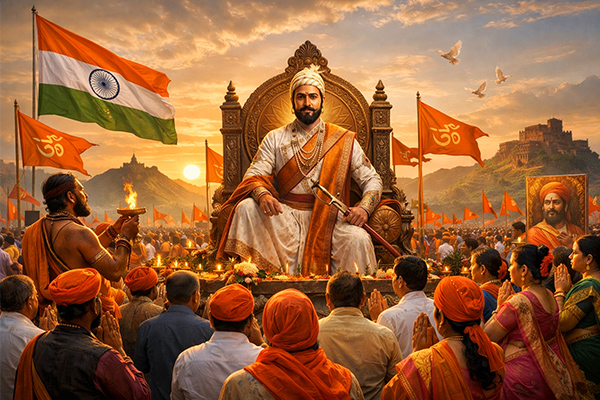
Finally, Chhatrapati Shivaji Maharaj Jayanti serves as a moment of spiritual reflection on the importance of unity, pride, and collective strength. His vision was to unite diverse regions and cultures under one banner of righteousness and freedom. As we commemorate his life, it is an opportunity to reflect on the spirit of unity and pride in one’s country, and to draw inspiration from his unwavering faith in the strength of his people and their ability to overcome challenges together.
In conclusion, Chhatrapati Shivaji Maharaj Jayanti is a celebration of more than just a military hero-it is a day to honor a spiritual leader who embodied values of justice, equality, faith, and righteousness. His life continues to guide and inspire millions, making this day a powerful reflection of the eternal virtues that transcend time and guide humanity toward a more harmonious existence.
History of Chhatrapati Shivaji Maharaj Jayanti
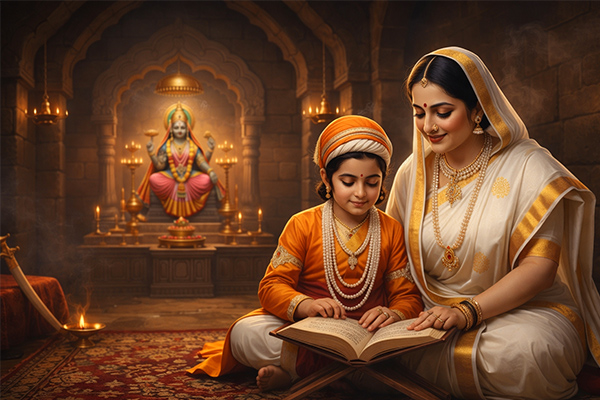
Chhatrapati Shivaji Maharaj Jayanti is a day of immense pride and reverence, celebrated to honor the birth of one of India’s most legendary and visionary figures, Chhatrapati Shivaji Maharaj. Born on February 19, 1630, at the historic Shivneri Fort near Pune, his life is an extraordinary saga of courage, intelligence, and resilience. More than just a king, Shivaji Maharaj is remembered as a revolutionary leader who laid the foundation for the Maratha Empire and inspired generations with his unwavering commitment to freedom, justice, and the welfare of his people.
Shivaji Maharaj’s story begins with his mother, Jijabai, a woman of remarkable strength and devotion. She raised Shivaji in a world of stories about valor, duty, and the pursuit of righteousness. His father, Shahaji Bhosale, was a Maratha general in the service of the Deccan Sultanates. From a young age, Shivaji exhibited an unyielding spirit and an exceptional intellect, developing a keen interest in military strategy, governance, and the protection of his people. His early exposure to the teachings of warfare and leadership would later help him carve out an empire in a land filled with mighty empires and adversaries.
At just 15, Shivaji captured his first fort, Torna Fort, marking the beginning of his journey as a warrior. This bold move against established powers set the tone for his future campaigns, as he began to rally others to his cause of establishing a sovereign Maratha kingdom. His military brilliance and tactical innovations helped him grow from a young warrior into a force to be reckoned with.
Chhatrapati Shivaji Maharaj’s crowning achievement came in 1674, when he was formally coronated as Chhatrapati, the sovereign ruler of the Maratha Empire. His coronation at Raigad Fort was a historic moment, symbolizing the birth of an empire that would challenge the might of the Mughal Empire and alter the course of Indian history. Under his leadership, Shivaji Maharaj not only expanded his kingdom but also established a robust and efficient administration. He pioneered military innovations such as guerrilla warfare, which allowed his smaller forces to successfully confront much larger and stronger enemies. His kingdom was characterized by a progressive system of governance, with a focus on social justice, religious tolerance, and a highly organized military.
Shivaji’s military genius was matched by his ability to inspire loyalty among his soldiers and citizens. He was known for his empathy toward his people, upholding the values of justice, fairness, and respect for all religions. He championed the rights of farmers, traders, and artisans, and his policies helped foster a spirit of unity and prosperity within his empire.
One of the most spiritually significant aspects of Shivaji Maharaj’s reign was his unwavering commitment to religious tolerance. Despite being a staunch Hindu ruler, he respected all faiths, including Islam, and ensured that people from different communities were treated with equality and fairness. He invited scholars, religious leaders, and thinkers from various backgrounds to his court, creating an atmosphere of cultural and religious harmony. This inclusive approach to governance set him apart from many other rulers of his time and is a key reason why his legacy has endured across centuries.
Shivaji Maharaj’s sense of justice was deeply rooted in his belief in dharma (righteousness). He was known for taking swift action against corruption and injustice, often personally overseeing the administration of his kingdom. His people saw him not just as a king, but as a protector and a guide, someone who fought not only for territorial expansion but for the welfare and dignity of his citizens.
As the years passed, the extraordinary achievements and character of Chhatrapati Shivaji Maharaj became legendary, and his birthday, February 19, was celebrated as a day of remembrance and honor. Over time, this day became more than just a commemoration of a historical figure — it grew into a celebration of the values that Shivaji Maharaj stood for: courage, justice, religious tolerance, and selfless leadership. The observance of Shivaji Maharaj Jayanti began as a way for his people to pay tribute to his memory, and it soon expanded across Maharashtra and beyond. The day became a symbol of the Maratha spirit, a call to honor his legacy and draw inspiration from his life. Schools, communities, and institutions celebrate the occasion with grand processions, cultural events, and speeches that recount Shivaji Maharaj’s courage, wisdom, and leadership.
Today, Shivaji Maharaj Jayanti is a day of national significance, especially in Maharashtra, where people from all walks of life come together to remember and celebrate the life of the great king. Statues of Shivaji Maharaj are adorned with flowers, temples and forts associated with him are visited, and his contributions to Indian history and society are discussed and revered. The day serves as a reminder of his indomitable spirit and the principles he lived by — principles that continue to guide and inspire generations.
Chhatrapati Shivaji Maharaj Jayanti is not only a celebration of a great ruler; it is a tribute to the enduring qualities of leadership, valor, and justice. Shivaji Maharaj’s legacy remains a beacon of hope and inspiration, urging us all to live with integrity, honor, and a commitment to the welfare of others. On this day, we not only honor the life of a king but also the timeless values he embodied — values that continue to shape the spirit of India.
What to do on Chhatrapati Shivaji Maharaj Jayanti
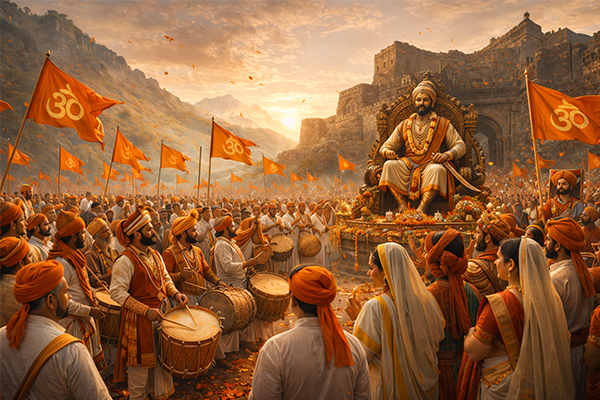
Chhatrapati Shivaji Maharaj Jayanti is a day filled with pride, remembrance, and reverence as people across India come together to celebrate the birth of one of the nation’s greatest heroes. This day is not just a commemoration of a historical figure; it is a tribute to the values, principles, and indomitable spirit that Shivaji Maharaj embodied throughout his life.
The celebrations begin early in the morning, with people flocking to statues and temples dedicated to Shivaji Maharaj to offer flowers, garlands, and heartfelt prayers. As devotees stand before these statues, they take a moment to reflect on his remarkable journey—his courage, justice, and selfless leadership. It’s a time to honor the man who, against all odds, founded the Maratha Empire and inspired countless generations with his unwavering resolve.
Across Maharashtra, and in many other parts of India, grand processions fill the streets. These lively parades are not just a show of celebration but also a vivid reminder of Shivaji Maharaj’s military genius and leadership. The air is filled with the sounds of drums, traditional music, and enthusiastic chants of “Jai Shivaji.” Reenactments of his battles and victories are performed, bringing to life the extraordinary courage and strategies that defined his reign. People of all ages, from children to the elderly, march together, united in pride for their great king.
The day is also marked by cultural programs and speeches in schools, colleges, and community centers. Performances ranging from traditional dances to dramatic renditions of Shivaji Maharaj’s life captivate audiences, helping to keep his legacy alive for the younger generation. Public figures and leaders deliver impassioned speeches, reminding everyone of Shivaji Maharaj’s far-reaching impact, not just as a warrior but as a ruler who believed in justice, religious tolerance, and equality for all his subjects.
For those who wish to dive deeper into the history of this legendary king, Chhatrapati Shivaji Maharaj Jayanti is the perfect occasion to immerse in stories and books about his life. Many people take time to read about his military strategies, his fight against tyranny, and his remarkable feats of leadership. Documentaries and historical accounts of his life are shared, sparking discussions and debates about his influence on India’s history and future.
In the spirit of honoring Shivaji Maharaj, people often visit significant historical sites associated with his legacy. Forts like Raigad, Shivneri, and Torna, where Shivaji Maharaj spent his youth, are some of the places that attract visitors. These forts are more than just remnants of history—they serve as powerful symbols of the king’s determination and vision, reminding visitors of the trials he overcame to establish the Maratha Empire.
Throughout the day, fairs and exhibitions take place, bringing communities together to celebrate not just the man but the culture and heritage of the Maratha Empire. These vibrant events showcase traditional foods, crafts, and performances, creating an atmosphere of festivity and pride. Amidst the celebrations, the spirit of unity and courage that Shivaji Maharaj instilled in his people continues to inspire all who partake in the day’s events.
As the day comes to a close, many devotees take a moment to pray for the prosperity, unity, and strength of the nation. Inspired by Shivaji Maharaj’s leadership, these prayers are a reminder of the importance of working together, no matter the challenges that lie ahead. For in honoring Shivaji Maharaj, we also honor the ideals of justice, bravery, and unity that he stood for—values that continue to shape the spirit of India to this day.
Chhatrapati Shivaji Maharaj Jayanti Puja Vidhi
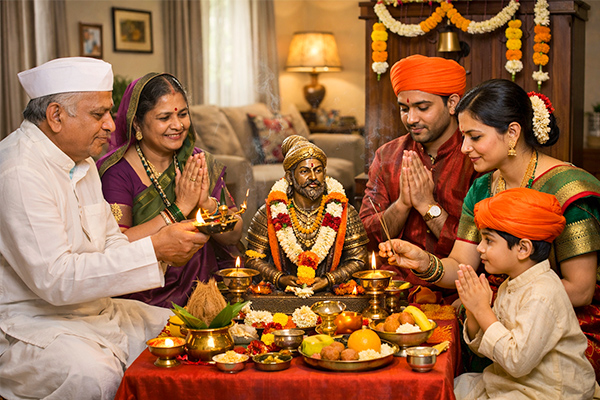
The Chhatrapati Shivaji Maharaj Jayanti Puja is a special occasion to honor the great king and warrior, Chhatrapati Shivaji Maharaj. The puja is performed with immense devotion and respect, especially in Maharashtra, and involves a series of rituals to celebrate his bravery, leadership, and his contributions to the nation. Here is a simple and detailed procedure for performing the puja:
1. Preparation for the Puja
Start by cleaning the house or the area where you plan to perform the puja. It is important to create a peaceful and pure environment. Arrange a clean, raised platform or altar for placing the idol or image of Chhatrapati Shivaji Maharaj. If you have a statue, make sure it is polished and adorned with flowers and garlands.
You can also display a portrait of Shivaji Maharaj along with his weaponry (like a sword, shield) to symbolize his bravery and kingship.
On the puja table, place the following items:
- A picture or idol of Chhatrapati Shivaji Maharaj
- Fresh flowers (for offering)
- Incense sticks (agarbattis) for creating a sacred atmosphere
- A bell (to signify the beginning of the puja)
- Lamps (diya) to light during the puja
- Sweets or Prasad (offerings like coconut, fruits, or specially prepared dishes that are dear to Shivaji Maharaj)
- A clean plate or small vessel to place the offerings
2. Invocation and Offering of Prayers
The puja begins with the chanting of sacred verses and prayers. Light the incense sticks and lamps to create a divine atmosphere. Stand or sit in front of the idol or portrait of Shivaji Maharaj and offer your prayers. Begin by chanting:
Ganesh Vandana:
Start by invoking Bhagwan Ganesha to remove any obstacles in your puja.
“ॐ गं गणपतये नमः”
Om Ganapataye Namah
Chhatrapati Shivaji Maharaj Prayers: After invoking Ganesha, chant the following prayer to honor Shivaji Maharaj:
“शिवाजी महाराज की जय हो, स्वराज्य रक्षक, धर्म के पथ पर दृढ, आपकी लाठी, आपकी तलवार, सदा हमारी शक्ति, सदा हमारा मार्गदर्शन। जय शिवाजी, जय भवानी!”
Translation: “Victory to Chhatrapati Shivaji Maharaj, protector of the kingdom, steadfast on the path of righteousness. Your staff, your sword, forever our strength, forever our guidance. Victory to Shivaji, Victory to Bhavani!”
You can recite the above mantra and continue offering fresh flowers, one by one, while chanting the praises of Shivaji Maharaj.
3. Offering of Flowers and Prasad
Offer fresh flowers one by one to the idol or picture of Shivaji Maharaj as you chant his names. This is a gesture of respect and devotion. Offer the sweets, fruits, or any other prasad as a mark of gratitude for his sacrifices for the nation.
It is customary to place a coconut on the altar as a symbolic offering of purity and auspiciousness. After offering the prasad, sit in silence and meditate on the virtues of Shivaji Maharaj, including his courage, intelligence, and dedication to the welfare of his people.
4. Chanting Shivaji Maharaj’s Name and Bhajans
Many people prefer to chant Shivaji Maharaj’s name or sing bhajans (devotional songs) in his honor during the puja. You can recite his name with reverence:
“Jai Shivaji Maharaj, Jai Bhavani”
This chant is commonly used during the puja to express devotion and gratitude toward Shivaji Maharaj.
Bhajans and devotional songs dedicated to Shivaji Maharaj can be played, such as 'Shivaji Maharaj Ki Jai' or other regional Marathi songs that honor his life and bravery.
5. Aarti (Closing Prayer)
The puja concludes with the singing of Aarti in honor of Shivaji Maharaj. The aarti is an important part of the worship and involves the singing of devotional hymns, typically done with a bell in hand and lighted diyas. You can sing the following aarti:
Shivaji Maharaj Aarti:
'जय भवानी, जय शिवाजी,
जय शिवाजी, जय भवानी!'
The aarti should be sung with devotion and reverence while waving the lighted diya in circular motions around the idol or portrait. Offer your final prayers of gratitude and seek blessings for the strength, courage, and wisdom of Shivaji Maharaj.
6. Concluding the Puja
After the aarti, it is customary to distribute the prasad among family members and guests. The prasad symbolizes the blessings of Shivaji Maharaj. The puja can conclude with a prayer for the well-being of the nation and the people.
You can also offer a personal prayer to seek courage, wisdom, and leadership qualities inspired by Shivaji Maharaj, to help navigate life’s challenges with dignity and justice.
This simple yet profound puja ceremony is a beautiful way to connect with the legacy of Chhatrapati Shivaji Maharaj and renew your devotion to his values of bravery, integrity, and selfless leadership.
Chhatrapati Shivaji Maharaj Jayanti Puja Mantra
This mantra honors Shivaji Maharaj’s deep commitment to his kingdom and his belief in justice, helping people recognize his significance as a leader who fought for the well-being of his people.
Shivaji Maharaj Vandana Mantra
Sanskrit:
'जय शिवाजी महाराज की जय,
स्वराज्य रक्षक धर्म के पथ पर दृढ,
तुमसे प्रेरित हो हर वीर,
तुम्हारी महिमा सदा अमर।
जय शिवाजी, जय भवानी।'
English Translation:
'Victory to Shivaji Maharaj,
The protector of Swarajya, steadfast on the path of righteousness,
Every warrior is inspired by you,
Your glory is eternal.
Hail Shivaji, Hail Bhavani!'
Chhatrapati Shivaji Maharaj Jayanti Vrat Vidhi
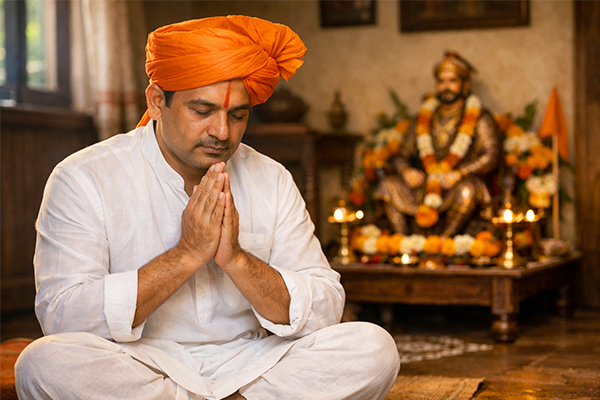
Many devotees and admirers of Shivaji Maharaj observe a fast on this day to express their devotion, respect, and reverence for his contributions to the Maratha Empire and to India. The fasting procedure on this day is simple yet meaningful, focusing on the spirit of discipline, gratitude, and remembrance.
Here is a step-by-step procedure to fast on Chhatrapati Shivaji Maharaj Jayanti:
Pre-Fasting Preparation:
Before starting the fast, prepare yourself mentally and spiritually. Fasting on Shivaji Maharaj Jayanti is not only a physical act of abstinence but also a spiritual practice. Ensure that your heart and mind are focused on gratitude for his contributions and leadership.
- Cleanse your surroundings: Clean the home or the area where you plan to perform the fast and puja. A clean space symbolizes purity and sets the tone for a meaningful ritual.
- Gather offerings: Have items like fruits, flowers, coconut, ghee, and sweets ready for the ritual offering. The prasad (offering) should reflect simplicity and respect.
Morning Rituals:
The day of fasting should begin with a holy bath early in the morning, preferably during Brahma Muhurta (the auspicious time before sunrise). A clean body is considered essential before starting the fast.
Offer prayers: As you prepare for the fast, offer your prayers to Shivaji Maharaj. You can chant mantras or prayers like “Jai Shivaji Maharaj” or the Shivaji Maharaj Vandana to invoke his blessings for strength and guidance.
Start the Fast with Devotion:
The fast can be either a complete fast (no food or water) or a partial fast (light food like fruits, nuts, and milk). It’s important to follow the method that feels most appropriate based on your health and spiritual preferences. Generally, the fast is observed until the Parana (breaking the fast) on the following day.
If you opt for a complete fast, refrain from eating or drinking throughout the day. This is done to show respect for the sacrifice and discipline that Shivaji Maharaj displayed throughout his life.
If you are observing a partial fast, stick to eating fruits, dry fruits, or drinking milk during the fasting period.
Puja and Prayer Ceremony:
During the fasting day, devote time to prayers, chanting, and worship. A simple puja or prayer ritual can be performed either at home or at a temple. Here’s a basic procedure for the puja:
- Invocation: Begin by invoking Bhagwan Ganesha to remove obstacles and then pray to Shivaji Maharaj, seeking his blessings for courage, justice, and prosperity.
- Offerings: Offer flowers, fruits, and sweets to the image or idol of Shivaji Maharaj. As you offer the items, recite prayers or mantras like 'Jai Shivaji Maharaj', 'Jay Bhavani, Jay Shivaji', or specific aartis or Shivaji Maharaj Vandana.
- Meditation: Spend some time in silent meditation, reflecting on the qualities of Shivaji Maharaj—his bravery, wisdom, and commitment to his people. This will help strengthen the spiritual connection with the king.
Evening Prayers:
In the evening, perform a small puja again or offer prayers before the idol of Shivaji Maharaj. Light a diya (lamp) and incense sticks to create a divine atmosphere. Chant prayers and recite the aarti of Shivaji Maharaj to close the evening's rituals.
You may also reflect on the stories of his bravery, his governance, and his commitment to Swarajya (self-rule), remembering his leadership qualities.
End of the Fast (Parana):
The fast concludes on the next morning after the Brahma Muhurta (early morning time). Parana is the process of breaking the fast.
- Start with a simple offering: Begin with a light meal, such as fruits, nuts, or a glass of milk. It’s important not to overeat or indulge in heavy foods right away to maintain the sanctity of the fast.
- Pray and offer gratitude: Before you begin eating, offer your prayers once more to Chhatrapati Shivaji Maharaj. Give thanks for his blessings and pray for strength, prosperity, and guidance in your life.
Distribute Prasad and Share the Joy:
After breaking the fast, it is customary to distribute the prasad (food offering) among family members, friends, and neighbors. This act symbolizes the sharing of blessings and joy, reflecting Shivaji Maharaj’s emphasis on unity and the well-being of the community.
Observing the fast on Chhatrapati Shivaji Maharaj Jayanti is a meaningful way to honor the spirit and legacy of the great warrior king. Whether you choose to perform a complete fast or a partial fast, the focus is on devotion, reflection, and respect for his life and ideals. Through fasting, prayer, and meditation, one can connect more deeply with the teachings and values that Shivaji Maharaj exemplified—bravery, leadership, justice, and selfless service to the nation.
Chhatrapati Shivaji Maharaj Jayanti Vrat Katha
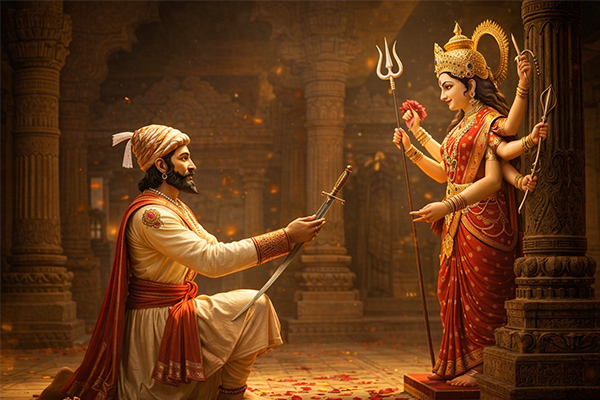
The Chhatrapati Shivaji Maharaj Jayanti Vrat Katha is a significant story often shared during the celebrations of Shivaji Maharaj's birth anniversary. While there are various tales, most of them highlight the immense courage, devotion, and strategic brilliance of Shivaji Maharaj. However, the fasting story associated with this day typically revolves around how Shivaji Maharaj's life and his commitment to his people and country can inspire devotion, discipline, and selfless service.
The Legend of Shivaji Maharaj's Devotion and Discipline
Chhatrapati Shivaji Maharaj was known not only for his military prowess but also for his devotion to spirituality, justice, and duty. He believed in the importance of discipline, both in war and in personal life. One such example of his discipline is how he observed fasting and religious rituals, despite his busy life as a warrior and ruler. The story commonly told during Shivaji Maharaj Jayanti is that Shivaji Maharaj observed fasting on several occasions to seek blessings for the prosperity of his kingdom and the well-being of his people. He would often fast on special days dedicated to various gods and goddesses, performing rigorous rituals that involved prayer, meditation, and reflection.
The Story of Fasting to Gain Strength and Courage
It is said that on one particular occasion, Shivaji Maharaj fasted to seek the blessings of Bhagwan Shiva and Mata Bhavani (his mother’s deity) for victory and strength. Before a critical battle, he went on a fast to purify his mind and body, to ensure victory in the face of adversity. During this time, he invoked the divine powers of Bhagwan Shiva and Bhavani Mata, praying for their blessings to help him defend his kingdom against the enemies. This act of fasting showed his unshakable faith in divine protection, as well as his ability to balance both physical strength and spiritual devotion. Devotees often reflect upon this aspect of his life during the Chhatrapati Shivaji Maharaj Jayanti, emphasizing the importance of fasting for mental clarity, physical well-being, and spiritual growth.
The fasting stories associated with Chhatrapati Shivaji Maharaj Jayanti teaches us the importance of self-discipline and dedication to a cause greater than oneself. Shivaji Maharaj's observance of fasting was not just for personal gain, but to seek strength to protect his people and kingdom, uphold justice, and defeat the forces that threatened his values and way of life. This type of fasting wasn't just a ritualistic practice but a demonstration of focus, commitment, and devotion to a higher cause.
Conclusion
Chhatrapati Shivaji Maharaj Jayanti is not just a celebration of a remarkable king, but a tribute to the spirit of valor, wisdom, and justice that he embodied throughout his life. His legacy continues to inspire millions, not just in India but across the world, teaching us the values of courage, integrity, and the importance of standing up for what is right. As we commemorate this day, we are reminded of the extraordinary life of Shivaji Maharaj — his unwavering commitment to his people, his visionary leadership, and his relentless pursuit of freedom. Whether through fasting, prayer, or reflection, this day provides an opportunity to embrace the qualities that made Shivaji Maharaj a legend and strive to incorporate them into our own lives. His story is one of triumph over adversity, and on this auspicious day, we honor his memory, his principles, and his indomitable spirit that will continue to guide and inspire generations to come.


.png)

Comments 0
Leave your thought here